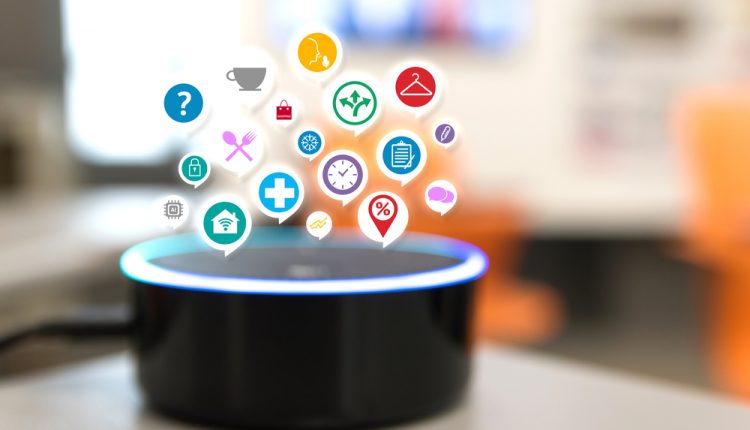Why voice is the next frontier
By Peter Schwartz, Senior Vice President of Strategic Planning for Salesforce

Voice technology is primed to become a primary user interface for companies, thanks to advances in artificial intelligence (AI), speech recognition, and proliferation of voice-enabled devices and services. A recent study found that the global voice recognition market is expected to be worth US$127.58 billion by 2024. Researchers also predict that by 2021, 40% of customers will use voice technology to accomplish a wide range of tasks — from searching for information to shopping.
It’s not hard to understand voice’s appeal to consumers and businesses alike. For one thing, it’s exceptionally easy to use — after all, people can speak up to four times faster than they can type. The technology behind voice interaction is also improving all the time. By deploying an AI ‘deep learning’ technique in which a software system is trained using millions of examples, drawing on massive amounts of computational power, researchers have been able to make computers much better at responding intelligently to spoken phrases. What’s more, the hardware to support voice user experiences (smart microphones, for example) is becoming cheaper to produce and more effective. Nearly 40 million people today in the US own a voice-enabled smart speaker.
Such developments are paving the way for businesses to adopt voice-enabled user interfaces to deliver richer, more convenient customer experiences. Voice technology has a vital role to play in the workplace, boosting productivity and efficiency by enabling workers to set meetings, ask simple questions and set reminders without stopping what they’re doing, for example.
But if companies want to seize the opportunities ahead as such interfaces gain traction, it’s vital that they find their own voices right away — developing the apps that can represent their brands and leave a powerful lasting impression.
Why the urgency?
The rise of voice assistants, such as Amazon Alexa, Apple Siri, and Google Assistant, is leading a fundamental change that will impact every business. Customers, partners, employees — every individual — will expect to engage with brands across every industry through voice-enabled interfaces. Against this backdrop, here’s what all businesses need to know about the rise of these technologies, and what they should be doing now to take advantage of them.
Delivering a superior customer experience
As a way to scale personalised experiences, voice offers enormous potential. After all, conversing feels natural to us — it’s how we communicate, share knowledge, and express emotions. Combine voice with facilities such as instant translation and it can break down barriers to communication and other, less natural interfaces, such as the mouse pad and keyboard.
I believe this is the real key to voice’s power: rather than typing, you just talk to the AI that controls it. Even kindergarteners, it seems, can get to grips with ordering via Alexa, such is the ease of the voice-enabled commerce experience — which is why some households have found they’ve ended up with an accidental shipment of pricey toys.
Mishaps like these aside, just think about the effort involved in taking a smartphone out of your pocket, opening an app, scrolling, and then clicking to find out if a store stocks a certain product. Now compare that to the following experience, soon to be a reality in the near future: a supermarket chatbot “converses” with you as you browse a store, supplying you with personalized ideas and promotions, guiding you to items that align with your particular dietary preferences, and even explaining the provenance of certain products.
Of course, voice isn’t for every situation: the same scenario also conjures images of large numbers of people simultaneously accessing voice systems in every corner of a store or workplace, to deafening effect.
However, the benefits to consumers of such an approach will become even more pronounced as voice-enabled devices and systems get to know us and use AI to predict the next action we want to take.
Imagine, for example, the impact of a hotel chain’s voice assistant greeting a returning customer with a warm welcome, before alerting them to the fact that the room temperature has been set to their preferred temperature, their favourite playlist uploaded, and the TV tuned to their most-watched channel.
Breaking the model for CPG brands
As these examples indicate, voice holds the potential to be a crucial differentiator in today’s hyper-competitive business landscape. But it also presents a host of new challenges. For some businesses — consumer packaged goods (CPG) companies, especially — there are real threats in the way the rise of voice is upending traditional paths to purchase.
At the heart of the issue is that people who buy a voice-enabled device from one of the market leaders (including Google, Apple, and Amazon) immediately become part of that company’s ecosystem as they are funneled to engage with its other products and services. Take the way consumers engage with Amazon’s Alexa-powered Echo Dot intelligent speaker, the best-selling product across Amazon’s retail site last Christmas, with millions of units sold.
It’s ultra-easy and convenient for people who buy an Echo to turn to Alexa to help them shop. But when a voice assistant is the interface, we don’t see our choices — we simply ask for them. For example, a consumer may see a commercial for diapers and can immediately ask, “Alexa, what’s the best diaper for a baby with sensitive skin?” to start the buying process.
In that context, unless shoppers specify a brand, Alexa is primed to recommend one. What’s more, she will steer them towards the Amazon private label version in a pinch. That could undermine any influence brand names have built up, or see brands simply replaced by convenience factors such as price and delivery speed.
With the likes of Alexa and her ilk creating increased brand agnosticism in the CPG space in this way, once-defendable shares of shelf positions or store distribution become much less important. It’s the same with selling on websites: the traditional advantages offered by banner ads or emailing marketing campaigns simply no longer apply.
Get ready for a new frontier
The threats are obvious. Researchers have found that 85% of Amazon customers select the recommended Amazon product when voice shopping. A new study also suggests that 67% of millennials and Generation Z-ers already use voice-enabled personal assistants like Siri and Alexa to connect with companies.
To get any market share at all, CPG businesses need to take action now, enabling their apps with voice to avoid disintermediation by gatekeepers like Amazon.
In the longer term, AI and voice recognition technology will continue to evolve, ushering in a new era of voice-enabled user experiences that turn the customer experience on its head. If businesses are not already primed to consider how they approach voice with respect to brand messaging and business objectives, they should do so without delay. Otherwise, the future consensus may be that they just don’t care about your customers. Voice, after all, is the next frontier.





